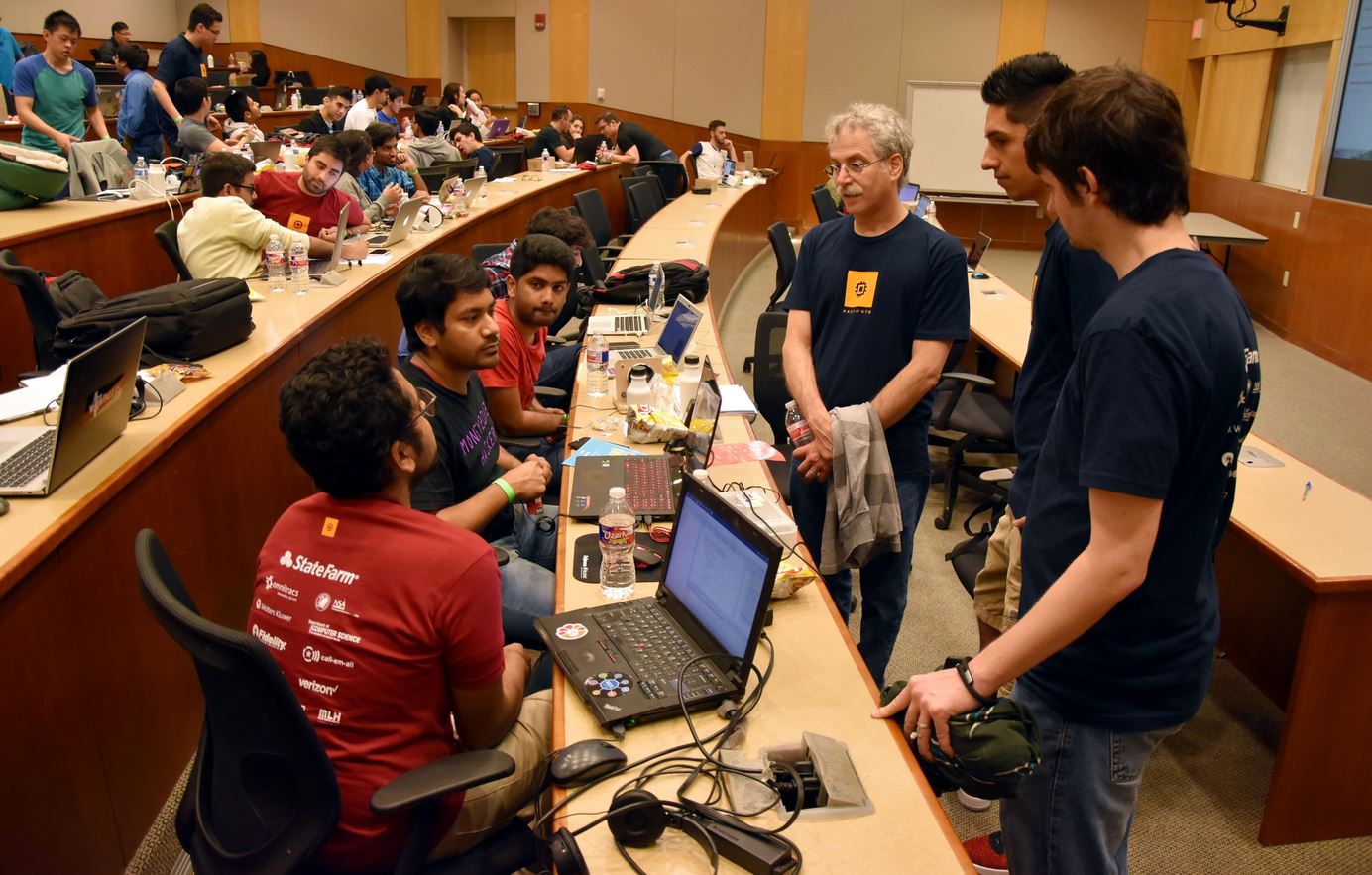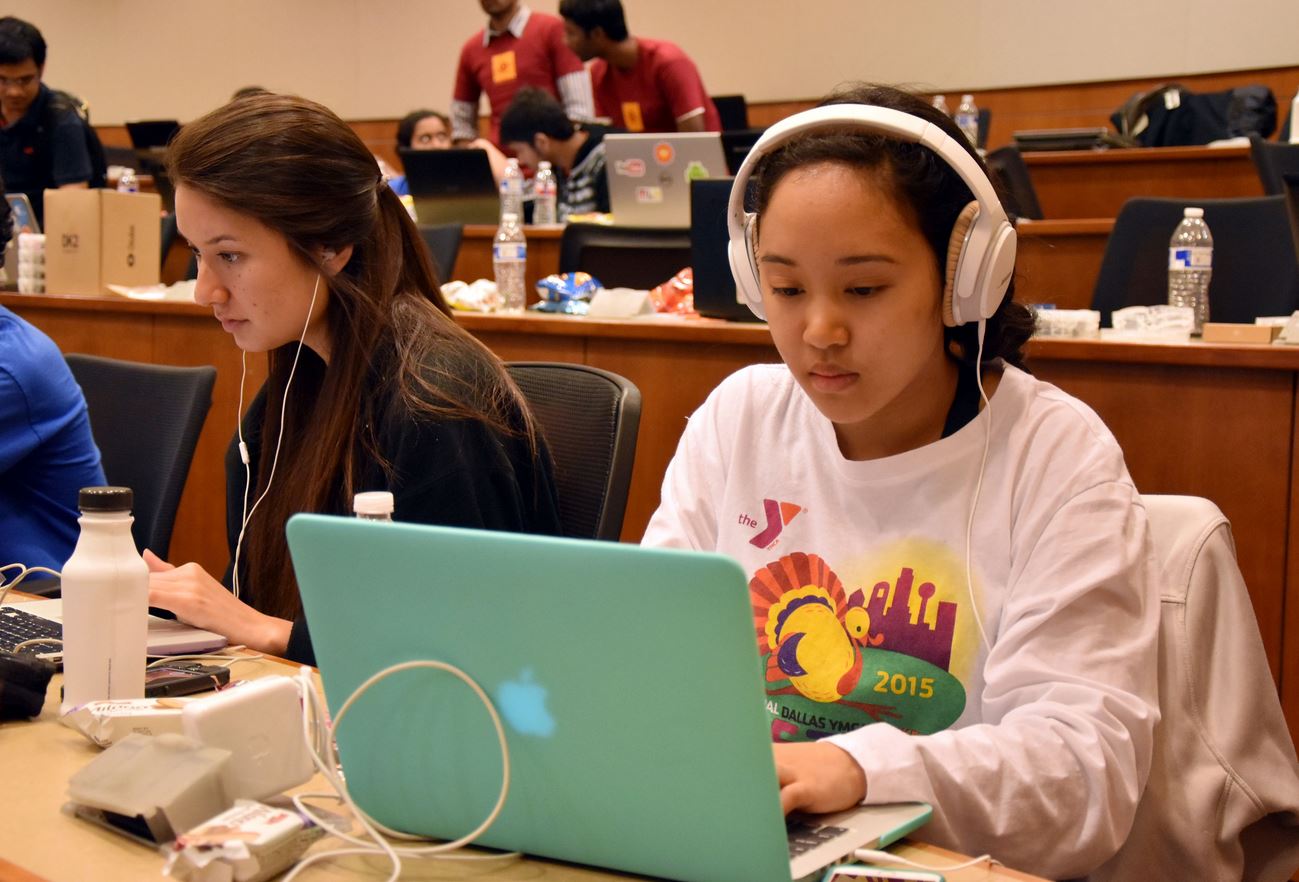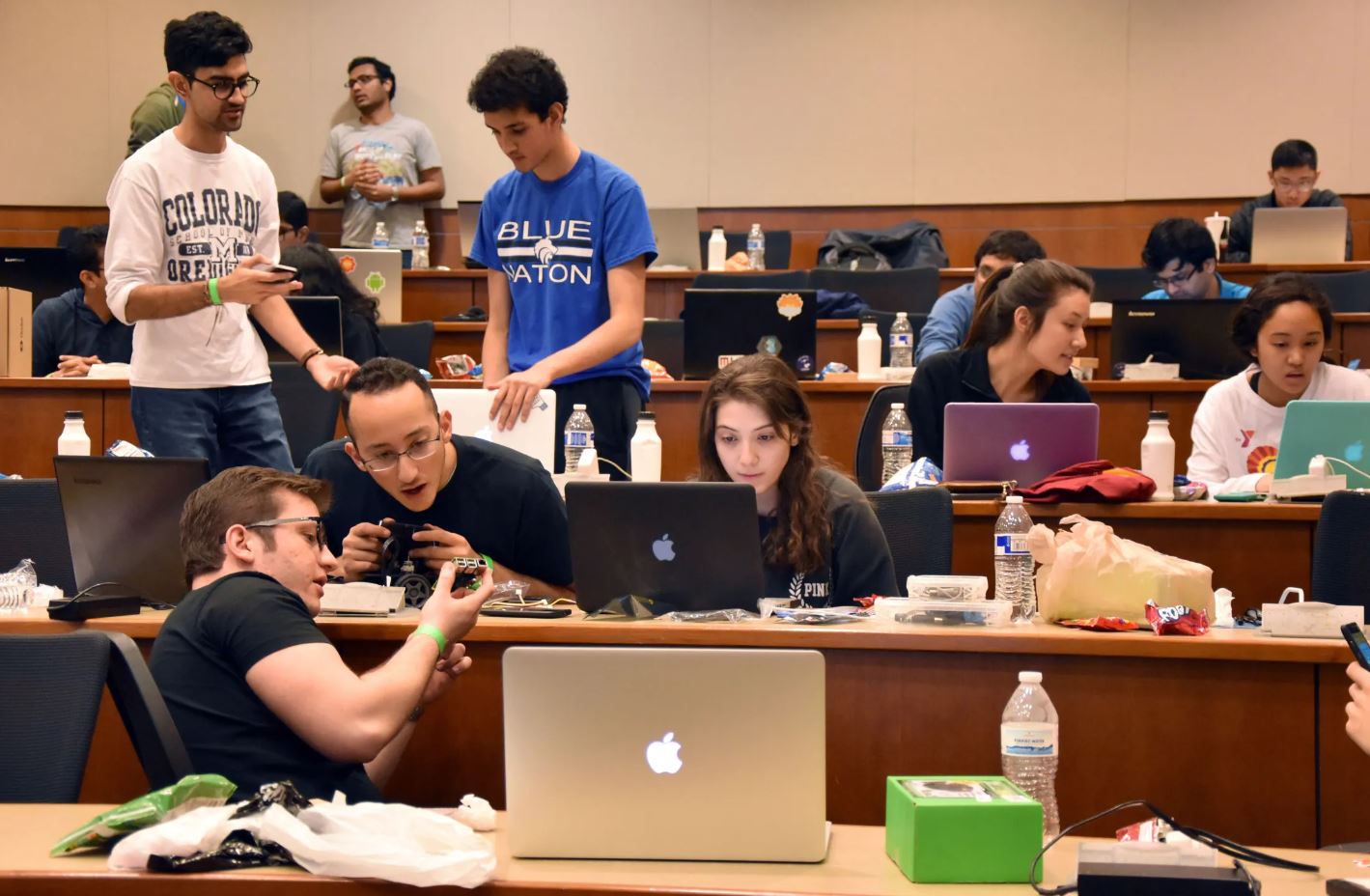HackUTD’16 Challenges 500 Students for 24 Hours of Ideas, Hacking, and Design
Five hundred students from across the nation convened at the UT Dallas Computer Science Department for the second year of HackUTD. Whereas last year’s HackUTD was open to only UT Dallas students, this year, the registration for HackUTD’16 was open to the public. The second HackUTD was organized by the UT Dallas Student Chapter of the ACM (Association for Computer Machinery) with the guidance of UT Dallas CS Professor John Cole, with the goal of bringing together young coders to challenge them to design and develop an original product utilizing their knowledge and skills that they have accumulated over the years. This year’s hackathon was focused on both novice and experienced hackers.
HackUTD, now one of the largest Hackathons in North Texas, began at 9:30 am on Saturday, March 26, with registration and the opening ceremonies featuring an inspirational pep talk by Jeremy Vickers, Executive Director of the UT Dallas Institute for Innovation and Entrepreneurship. During his opening speech, Jeremy Vickers inspired the students by saying, “Always create something! Y’all have spent precious time developing your ideas into products. Work on that! Not only is that a great tool for your resume, but also it will help you see how an idea from its inception to development has the ability to make you learn and grow!”
Students officially started working, hacking together their respective applications at noon Saturday, and a mere 24 hours later, the event was finished, and the judging panel was ready to assess the 31 completed projects. The projects were judged based on their uniqueness, complexity, and impact factor. The Major League Hacking (MLH) organization sponsored the equipment rentals for the event. Attendees were able to utilize equipment such as KinectDeveloper Bundles, Windows IoT Developer Packages, and a 3D printer.
The event drew in applications from not only Texas and neighboring states but also from Northern Illinois, Florida, Georgia, the University of California at Berkley, and even the University College of London in England. The UT Dallas Chapter of the Association for Computer Machinery received close to 1,000 inquiries from potential participants. Ultimately 600 RSVP’d to the event, and approximately 500 attended.
One of the major elements of HackUTD was the interaction between the students, sponsors, and industry mentors. In between coding their apps, attendees were free to network with company representatives and get assistance on projects from mentors. During the 24-hour event, students were offered the option to attend three tech talks hosted by the event sponsors. The Tech company, Wolters Kluwer, offered students a workshop on how to use Azure Service Fabric to power cloud computation. State Farm’s Tech Talk offered the students the opportunity to hear about the creation of the State Farm mobile app using Hadoop and data processing. Finally, the NSA in collaboration with the Laboratory for Telecommunication Sciences, offered a Tech Talk presented by UT Dallas CS alumni focusing on cybersecurity and SSH Tunneling. Throughout the hackathon, attendees were provided a medley of fun and engaging activities to attend when they needed a break from hacking. The events included a series of game tournaments in Super Smash Bros. and Halo 3 Doubles, raffles, a HackHunt where attendees search for eggs containing prizes and tickets, and Animation night, presented by Funimation.
At the end of the 24 hours at noon on Sunday, a total of 31completed projects were open to being evaluated by the judging panel. Among the projects were virtual reality games, computer games, programs, apps, and even a chair made entirely of recyclable materials. Prizes for all the awards totaled up to $3,050, sponsored by the UT Dallas CS Department.
The following are brief descriptions of first, second, and third place winners of HackUTD’16.
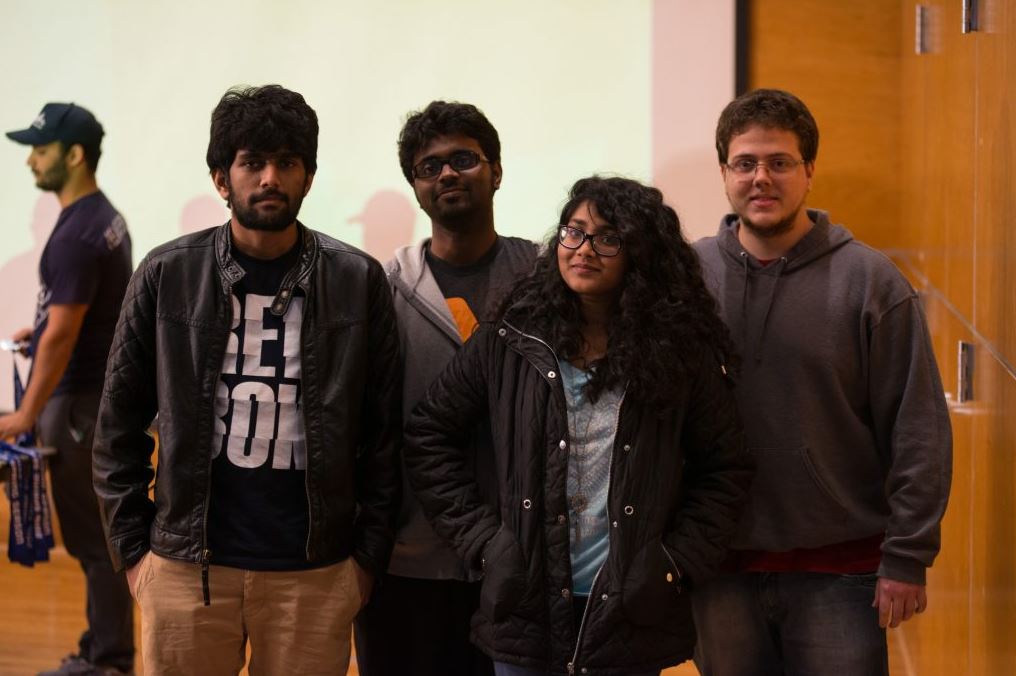
First Place: Pikkup Me, consisting of Ramakrishnan Sathyavageeswaran, Ronaldo Goncalves Junior, Hamid Muneerudhakalvathi, Mary Pratima Yedluri. The PikkupMe app is best described as the tinder for car sharing in small communities such as college towns or housing communities. Essentially solving the problem of carpooling in areas where bus transport is scarce. This project also won “Best UX Hack”
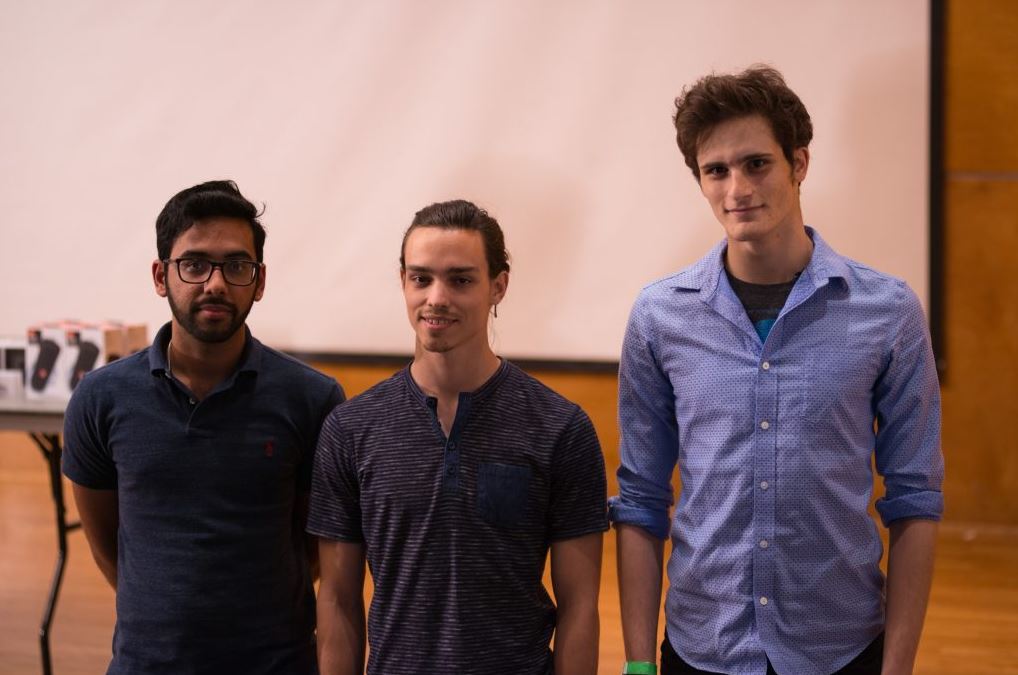
Second Place: IoFood, consisting of Jusung Lee, Kevin J. Nguyen, and Wilson Ding. IoFiid is a cross-platform IoT smart pantry. IoFood keeps track of the users’ pantry inventory in real-time and connects it to a database in the cloud where it is accessible at any time.
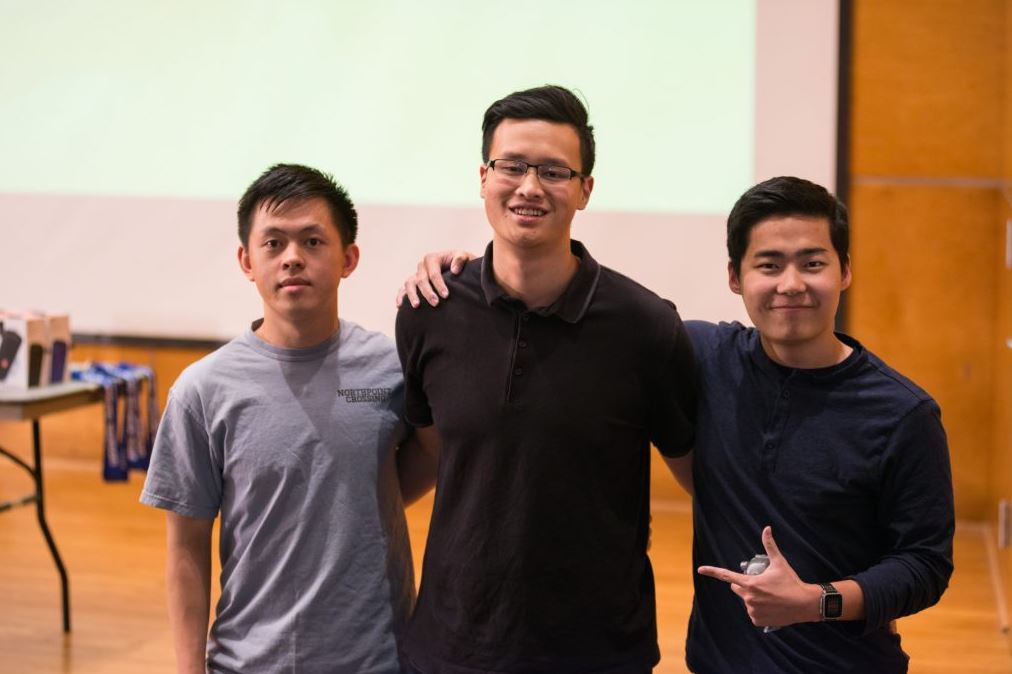
Third Place: Venture, consisting of Marwan Kodeih, Jay Butera, Devesh Laungani. Venture is a multiplayer game that interfaces with a virtual reality headset or ordinary game with a friend’s smartphone, utilizing both virtual reality and smartphone game interfaces.
Additional separate awards were presented. These included:
- Best UX Hack: The winning team who provided the best and most well-thought-out user interface and experience to its users were awarded a prize courtesy of the UX Club at UTD. The winner of this prize was the app Pikkup Me, a carpooling app for students.
- Weeb Hacks (2): Projects were judged based on the following – How weeby is it? How technically difficult was it? Would a weeaboo use it? How many? Was it weeaboo-tested and certified? Two teams were awarded this prize, Sushi Chef Simulator 2016and WeabooDatLife.
- Best Domain Name: Best domain name presented by com. Awarded to Weeab-Sume
- Best Developer Tool: Team with the best tool that helps developers, prizes sponsored by Major League Hacking (MLH). Winners of this award went to the app Murmur.
Sponsors for the event included State Farm, The UT Dallas Department of Computer Science, Omnitracs, Laboratory for Telecommunication Sciences, National Security Agency (NSA), Wolters Kluwer, Fidelity Investments, Google, Verizon, Quesbook, Call-Em-All, Major League Hacking (MLH), Microsoft, Soylent, Funimation, Namecheap, and Zapier.
The UTD ACM plans to host another HackUTD in 2017, expanding the event to students in every career path.
View additional photos from the HackUTD’16 event. View photos from past UT Dallas Computer Science events.
About the UT Dallas Computer Science Department
The UT Dallas Computer Science program is one of the largest Computer Science departments in the United States with over 1,600 bachelor’s-degree students, more than 1,100 master’s students, 160 PhD students, and 80 faculty members, as of Fall 2015. With The University of Texas at Dallas’ unique history of starting as a graduate institution first, the CS Department is built on a legacy of valuing innovative research and providing advanced training for software engineers and computer scientists.
*Photos of the winners courtesy of Tyler Anderson*
